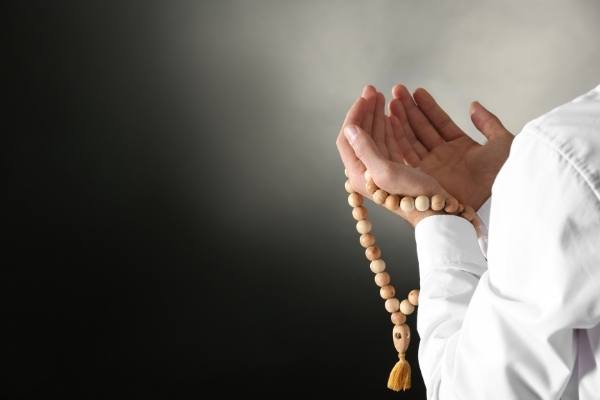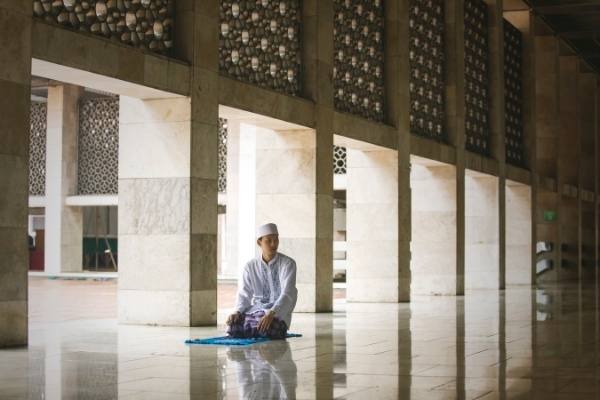Dua vs. Salah – Differences Between Islamic Prayers

What is the Main Difference Between Dua and Salah?
The key difference between Dua and Salah (also known as “Salat”) is that the Dua is the supplication to god for any need, while Salah is the prayer that Muslims perform five times a day, at specific times in a specific way.
Dua and Salah are two different forms of worship, but they both are congregational acts of devotion to god, which Muslims must perform with full consciousness of the presence of Allah.
While Dua and Salah are two practices that are very important in Islam. They are also one of the practices that people often do not understand.
Many people make the mistake of thinking one offers the same benefits as the other. That is not the case.

There are several differences between dua and salah. They are both important practices in Islam and help Muslims reach different religious and spiritual goals.
Keep reading to understand the differences between them:
Differentiating Terms:
Dua, Salat (Salah), Prayers in Islam
Comparison Table between Dua vs. Salah
| ❖ Basis | Dua | Salah |
|---|---|---|
| Obligation | None | 5 Times a Day |
| Time | Any | Fajr (dawn), Dhuhr (afternoon), Asr (evening), Maghrib (after sunset), and Isha (nighttime) |
| Language | Any | Arabic |
| Facing | Preferably Mecca | Always Mecca |
| For | Intimate Conversation with God | Adoration of Allah & Uniformity among Muslims |
What is Prayer – The Overview
Act of Talking with God

Prayer is one of the most common forms of religious expression. It’s a way for people to communicate with God or any other religious figure.
It’s a common practice in all major world religions including Christianity, Islam, Buddhism, and Judaism
Historically, prayer has been used for healing, for expressing gratitude, for requesting guidance, and for just about any other request someone may have.
There are different kinds of prayer as well, such as meditation and confession. Most religions have their own form of prayer, from the Christian’s “The Lord’s Prayer” to the Jewish’s “Shema Yisrael“.
There is no specific length or format for prayer, however, prayers can differ depending on the religion.
For example, in Christianity prayer can be done anywhere and there are also specific prayers done at specific times. As a Buddhist, prayer is done in a place of worship and done on specific religious days.
Each religion’s prayer may have different phrasing, but the purpose is the same. By praying we can express gratitude, get advice and help with our problems and learn to become closer to god.
Though prayer has evolved to suit the needs of different groups, but it’s always been around and will continue to be a way for people to talk to god.
What is Dua? – Meaning, Importance, and Time
Act of Praying in Islam

Dua (also spelled as Duh’a or Du’aa’) is an Arabic word that literally means “invocation” or “supplication”. It is used to express one’s inner needs, one’s opinions, one’s feelings, or even one’s hope or will.
The word Dua is also used to describe the actual act of praying.
In the Islamic context and in everyday terms, it is used for the act of supplicating or asking humbly to Allah through a specific act of worship.
It is a prayer spoken by Muslims that they use to invoke help to either themselves or someone who needs it. It is one of the most important acts of worship in Islam and is seen as something that is necessary for Muslims to do.
They may send their prayers through a special type of language and rhythm making it both personal and beautiful.
A dua can be said at any time by a Muslim including when asking for help or guidance for something, or to say thanks for something that has already happened.
It has been a crucial aspect of Muslim life for centuries. It is believed to strengthen one’s faith by making use of his/her close relationship with Allah.
Muslims have been using Dua for centuries and practice it because they find it very important in their own religious culture, tradition, and identity.
Islam has a lot to say about the importance of supplication, especially when there is an emergency, hardship, or calamity.
Holy Prophet (SAW) said about it: “Whoever does Dua to Allah, Allah fulfills his seeking or in exchange averts misfortune until the Dua is not related to sin or breaking some relation.” (Tirmidhi).
The Sequence of Saying Dua:
It is believed among Muslims that you should always try to pray in a set sequence to reap the best benefits of dua.
- Praise Allah (SWT)
- Praise the Prophet (SAW)
- Praise the Companions and the family of the Prophet (SAW)
- Pay for the deceased
- Pray for the whole Ummah
- Pray for your friends
- Pray for your family
- Pray for your Mom and Dad
- Pray for yourself
What is Salah or Salat? – Meaning, Importance, and Time
Obligatory Prayer Read 5 Times a Day in Islam

Salah (also spelled as “Salaah”, “Salat”, or “Salaat”) is the second Pillar out of the five pillars of Islam. It is the name for the obligatory prayers that are performed five times a day by observant Muslims as their formal, ritual prayers.
Performing salah is obligatory for all Muslims. An adult Muslim who is sane, healthy, and not traveling must perform the salah each day of his or her life.
It consists of a series of set movements that are performed while reciting prayers. The movements include standing, bowing, prostrating, and sitting.
Salah is intended to focus the mind on God and is seen as a personal communication with him that expresses gratitude and worship.
It is done as a form of religious duty, to express their love and thankfulness towards their god, their own purification, and spiritual nourishment.
The five times of obligatory prayer are: immediately after sunrise (Fajr), in the early afternoon (Dhuhr), in the mid-afternoon (Asr), in the early evening (Maghrib), and shortly after evening (Isha).
These five prayers are to be performed in time periods that typically span the entire 24-hour day. This helps Muslims stay in a state of ritual purity.
Comparison Video
Similarities between Dua and Salah
- Both are a method of prayer and showing affection toward God in Islam.
- Both have an important significance in following Islam.
Differences between Dua and Salah
Here’s an Amazing video to clear your doubts between Dua and Salah from Mufti Menk:
Obligation
The word Salah means prayer and is one of the five pillars of Islam that are mandatory for every Muslim. Dua is a type of prayer in Islam that is not mandatory but is highly recommended.
Time
A Dua is a prayer that can be said anytime or anywhere (you just need to have the right intention behind it), but Salah has very specific times and methods to be said.
Language
Although it is permissible to read Dua in any language, it is not permissible to read Salah in any language other than Arabic.
By reciting the prayer in Arabic, it is said that you’re simulating the experience of the prophet (SAW) in which he recited the prayer in Arabic as well. Muslims agree that the prayer should be recited in Arabic as it’s the language of revelation.
Facing Direction
The direction of the Qibla is the direction of prayer. Muslims must face the Kaaba in Mecca. The act of facing Mecca is a vital part of the prayer known as Salah.
While Dua is more flexible and can be said by facing any direction.
Purpose or Significance
Muslims believe that Allah (SWT) created the entire universe and everything in it, including humans and he has been kind enough to let them worship him and he has given them the gift of Salah to remind them of him and to reflect on how grateful they are to him for everything they have.
By praying Salah regularly each day, they feel that they are also unifying as a Muslim community and are following in the footsteps of their beloved Prophet (SAW).
While Dua is simply an intimate conversation with their god. Muslims believe it helps in growing their relationship with God.
Best Selling Islamic Gifts
Buy at the Best Price!
VS Difference Between is reader-supported. When you buy via links on our site, we may earn an affiliate commission at no cost to you. More Info.
Wrapping It Up
Dua (prayer) and Salah (praising) are two most important actions that are greatly emphasized in Islam.
They are 2 very important aspects of Islam. All Muslims should say Dua at least once a day after every obligatory prayer. This is a part of a Muslim’s daily routine.
Islam has made a clear distinction between the two. While Dua is more about asking Allah, Salah is more about praising Allah.
Frequently Asked Questions
How to Make Dua?
The first thing you should do is to praise Allah (SWT) by saying, “Al-Hamdulillah” (All praises to Allah) and “Subhan Allah” (Glory be to Allah), and “Allahu Akbar” (Allah is the Greatest).
The second thing to do is to send prayers upon the Prophet (SAW). You can send prayers and Durood upon the Prophet (SAW) by saying, “Pray for me, O Allah’s Messenger” or you may say, “O Allah, bless me and my father and my mother, just as You blessed the Prophet Muhammad (SAW) and his father and his mother.”
The third thing to do is to mention the attributes of Allah (SWT) using the ninety-nine Names. One Name you may use is “AL-HAFEEDH” (The Preserver, The All-Heedful, and All-Protecting).
You can make a dua by saying, “O Allah, the one who helps the oppressed see the light of relief by avenging their oppressors, you are the one who helps the thirsty see the sight of water, you are the one who helps the hungry to see the sight of food, you are the one who helps the one who is worn out by this world to see the light of the hereafter; O Allah, make me among those who’s oppressors are avenged, whose thirst is quenched, whose hunger is satisfied.”
What is Wudu?
Wudu means purification. That said, it is a process of cleaning one self in preparation for prayer.
Wudu, or ablution, is an essential part of the Islamic faith, and it is a mandatory part of the prayer ritual.
While there are several steps involved in the process, the basic idea is to remove any impurities surrounding the body, thus making it pure for the prayer, which is performed to be closer to Allah (SWT).
The two main forms of ablution, according to Islamic sources, are Ghusl, a full-body wash, and Wudu, a partial washing of the body.
What Breaks Wudu?
Activities that may invalidate wudu include urination, defecation, flatulence, deep sleep, light bleeding, menstruation, postpartum and sexual intercourse.
There are many other things that may invalidate wudu. Always best to refer to a local Imam for a complete list.
Does Eating Break Wudu?
No, Muslims are allowed to eat and drink after performing Wudu and this doesn’t break or invalidate Wudu.
Though, it is recommended to wash your hands and rinse your mouth to remove the impurities and the smell of food residue.
References
- Wikipedia Contributors. Salah. Wikipedia. Published May 24, 2022 (https://en.wikipedia.org/wiki/Salah)
- https://ieeexplore.ieee.org/abstract/document/8089304
Speak Arabic Fluently in 2 Weeks!
Understand the useful teachings of the Noble Quran by learning Arabic, without any extra stress!


